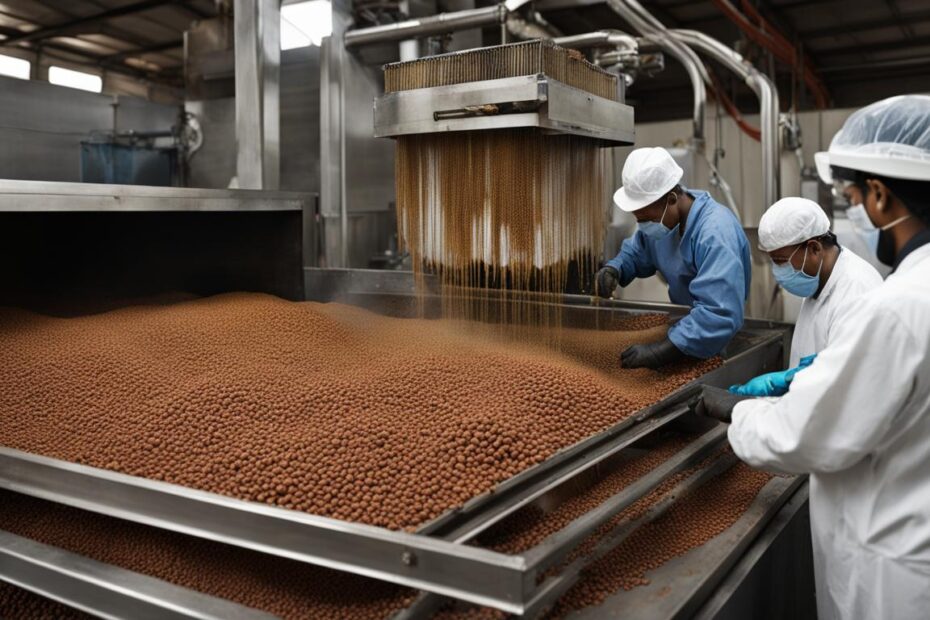Castor oil, derived from the seeds of the Ricinus communis plant, is a versatile product with numerous applications in medicine, personal care, and industry. The manufacturing process involves a series of steps to extract and refine the oil, ensuring its safety and quality for diverse uses.
The journey of castor oil production begins with the harvesting of castor beans, also known as castor seeds. These beans contain a toxic enzyme called ricin, but through careful handling and processing, the oil extracted from them becomes safe for use. The first step in production is cleaning and drying the castor beans to remove any impurities.
To extract the oil, two main methods are used: pressing and solvent extraction. Pressing involves applying pressure to the dried castor beans to squeeze out the oil. Solvent extraction is another method, wherein solvents like hexane are used to dissolve the oil from the beans. Both methods yield crude castor oil, which still contains impurities and needs further refining.
The refining process aims to purify the crude castor oil and enhance its quality. It involves various techniques such as filtration, degumming, neutralization, bleaching, and deodorization to remove impurities, color, odor, and undesirable substances. The final outcome is a clear, refined castor oil that meets the standards set by the industry.
Key Takeaways:
- Castor oil is made from the seeds of the Ricinus communis plant.
- The manufacturing process involves harvesting, cleaning, drying, and pressing or solvent extracting the oil from the castor beans.
- The extracted oil undergoes refining to remove impurities and enhance its quality.
- Various techniques, such as filtration, degumming, neutralization, bleaching, and deodorization, are used in the refining process.
- The result is a clear, refined castor oil that is safe and suitable for various applications.
Potential Benefits and Uses of Castor Oil
Castor oil offers a wide range of potential benefits and uses that make it a versatile product in medicine and personal care. Let’s explore some of the key advantages and applications of this natural oil.
1. Natural Laxative
Castor oil is commonly used as a natural laxative to relieve constipation. It works by stimulating the muscles of the intestines, promoting bowel movement and providing gentle relief. Incorporating castor oil into your digestive health routine can help maintain regularity and alleviate discomfort. However, it is important to use castor oil as directed, as excessive consumption may cause digestive disturbances.
2. Natural Moisturizer
With its rich composition of fatty acids, castor oil works wonders as a natural moisturizer. Its emollient properties help lock in moisture and deeply nourish the skin, making it a fantastic alternative to store-bought moisturizers and lotions. Regularly applying castor oil to the skin can leave it feeling soft, supple, and rejuvenated.
3. Wound Healing Properties
Castor oil has been found to promote wound healing due to its ability to create a moist environment that aids in tissue regeneration. It also possesses anti-inflammatory properties, which help reduce swelling and redness around wounds. Applying castor oil topically on minor cuts, scrapes, or dry skin patches can help accelerate the healing process and minimize the risk of infection.
4. Denture Cleaning
Did you know that castor oil can even be used for cleaning and storing dentures? Its antimicrobial properties help kill bacteria and fungi that can cause oral infections, keeping your dentures clean and fresh. Simply mix a few drops of castor oil with water and use the solution to clean your dentures regularly for optimal oral hygiene.
These are just a few examples of the many potential benefits and uses of castor oil. From its effectiveness as a laxative to its ability to improve skin health and aid in wound healing, castor oil has proven to be a versatile and natural remedy in various applications. Incorporating castor oil into your daily routine can enhance your overall well-being while offering effective and natural solutions to common health concerns.
Castor Oil Production and its Industrial Applications
Castor oil is a versatile product that finds applications not only in medicine and personal care but also in various industries. Its unique properties make it valuable in the production of cosmetics, as an industrial lubricant, and even in biodiesel production.
Castor Oil in Cosmetics
Due to its excellent moisturizing properties, castor oil is a popular ingredient in the production of cosmetics. It is commonly used in lotions, makeup products, and cleansers to provide hydration and nourishment to the skin. The oil’s emollient effects help to soften the skin, leaving it smooth and supple.
Castor Oil as a Lubricant
The high viscosity and excellent lubricating properties of castor oil make it ideal for use as an industrial lubricant. It is commonly utilized in machinery and equipment to reduce friction and wear. Its ability to withstand high temperatures and extreme pressures makes it suitable for heavy-duty applications.
Castor Oil in Biodiesel Production
Castor oil is also used in the production of biodiesel, a renewable and environmentally friendly alternative to traditional fossil fuels. The oil can be converted into a fuel component through a process called transesterification. Biodiesel derived from castor oil offers several advantages, including lower emissions and decreased dependence on non-renewable energy sources.
| Industrial Applications of Castor Oil | Description |
|---|---|
| Cosmetics | Used in lotions, makeup, and cleansers for its moisturizing properties. |
| Lubricants | Applied in machinery and equipment to reduce friction and wear. |
| Biodiesel Production | Converted into a fuel component for renewable and eco-friendly energy. |

Conclusion:How Castor Oil is Made
Castor oil, derived from the seeds of the Ricinus communis plant, is a valuable product with a wide range of applications. Through meticulous extraction and refining processes, castor oil is produced for use in medicine, personal care, and industry.
Its multipurpose nature is evident in the numerous benefits it offers. Castor oil serves as a natural laxative, providing relief from constipation. Its moisturizing properties make it a popular choice as a natural alternative to commercial skincare products. Additionally, castor oil aids in wound healing, creating a conducive environment for recovery and reducing inflammation.
Notably, castor oil plays an essential role in various industries. It is extensively used in cosmetics, forming the base of many lotions, makeup products, and cleansers due to its hydrating properties. Furthermore, its high viscosity and lubricating characteristics make it an ideal choice as an industrial lubricant for machinery and equipment. Additionally, castor oil is an important ingredient in biodiesel production, as it can be converted into a sustainable fuel component.
The versatile nature and diverse applications of castor oil highlight its significance in different fields. Whether it is utilized for its medicinal properties or its industrial applications, castor oil continues to be a valuable resource, contributing to the well-being of individuals and the progress of various industries.
FAQ
How is castor oil made?
Castor oil is made from the seeds of the Ricinus communis plant through a process called extraction. The seeds, also known as castor beans, are harvested, cleaned, and dried. The oil is then extracted by either pressing or solvent extraction methods. The extracted oil is refined to remove impurities and improve its quality.
What are the potential benefits and uses of castor oil?
Castor oil has several potential benefits and uses. It is commonly used as a natural laxative to relieve constipation. It also has moisturizing properties and can be used as a natural alternative to store-bought moisturizers and lotions. Castor oil can promote wound healing by creating a moist environment and reducing inflammation. It can also be used for cleaning and storing dentures to kill oral bacteria and fungi.
How is castor oil used in industries?
Castor oil has various industrial applications. It is used in the production of cosmetics, such as lotions, makeup, and cleansers, due to its moisturizing properties. Castor oil is also used as an industrial lubricant for machinery and equipment due to its high viscosity and lubricating properties. Additionally, castor oil is used in the production of biodiesel as a renewable resource that can be converted into a fuel component.
What are the different methods used in castor oil production?
Castor oil can be extracted from the castor beans through various methods, including pressing and solvent extraction. Pressing involves applying pressure to the beans to release the oil, while solvent extraction uses solvents to dissolve the oil from the beans. These methods are followed by refining processes to remove impurities and enhance the quality of the extracted oil.
What is the ricin content in castor beans, and is the oil safe for use?
Castor beans contain a toxic enzyme called ricin, but the heating process during oil production deactivates the ricin, making the oil safe for use. However, it is important to note that ingesting large quantities of castor oil can cause adverse effects, and it should be used in moderation and as directed.
